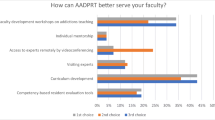Abstract
Objective
Childhood and adolescence represent a critical period for the potential initiation of substance use, and thus it is important that child and adolescent psychiatry (CAP) residents learn to screen, assess, refer, and/or treat children and adolescents who have substance abuse diagnoses.
Method
The authors conducted a survey by mail of directors from all accredited U.S. CAP residency programs in order to describe addiction training in their respective programs.
Results
Seventy percent of program directors responded and indicated diverse addiction training experiences for their residents. Findings indicate that the majority of CAP residents are treating patients with substance use disorders in both years of training and in multiple treatment settings.
Conclusion
The survey provides preliminary data for systemlevel constraints that merit additional consideration in order to potentially advance addiction training in CAP residencies.
Similar content being viewed by others
References
Martin CS, Kaczynski NA, Maisto SA, et al: Patterns of DSM-IV alcohol abuse and dependence symptoms in adolescent drinkers. J Stud Alcohol 1995; 56: 672–680
Harrison PA: Epidemiology, in Manual of Adolescent Substance Abuse Treatment. Edited by Estroff TW. Washington, DC, American Psychiatric Publishing, 2001, pp 1–12
American Academy of Child and Adolescent Psychiatry: Practice Parameter for the Assessment and Treatment of Children and Adolescents with Substance Use Disorders. J Am Acad Child Adolesc Psychiatry 2005; 44: 609–621
Steg JA, Mann LS, Schwartz RH, et al: Alcoholism and substance abuse teaching in child psychiatry residency programs. J Am Acad Child Adolesc Psychiatry 1990; 29: 813–816
American Medical Association: Accredited programs in child and adolescent psychiatry, in Graduate Medical Education Directory 2002–2003. Chicago, AMA, 2002, pp 443–452
Karem-Hage M, Nerenberg L, Brower KJ: Modifying residents’ professional attitudes about substance abuse treatment and training. Am J Addict 2001; 10: 40–47
Halikas JA: A model curriculum for substance abuse education in child and adolescent psychiatry training programs. J Am Acad Child Adolesc Psychiatry 1990; 29: 817–820
Dillman DA. Mail and Internet Surveys: The Tailored Design Method, 2nd ed. New York, John Wiley & Sons, 2000
Steg JA, Mann LS, Schwartz RH, et al: Comparison of child psychiatry residents’ and training directors’ perceptions of training for alcohol and substance abuse treatment. Acad Psychiatry 1992; 16: 103–108
Author information
Authors and Affiliations
Corresponding author
Additional information
This study was supported by grants from the Scaife Family Foundation and the Bodman Foundation.
The authors thank Bea Edner and the APA Committee on Training and Education in Addiction Psychiatry for their assistance.
Rights and permissions
About this article
Cite this article
Waldbaum, M., Galanter, M., Dermatis, H. et al. A Survey of Addiction Training in Child and Adolescent Psychiatry Residency Programs. Acad Psychiatry 29, 274–278 (2005). https://doi.org/10.1176/appi.ap.29.3.274
Received:
Revised:
Accepted:
Published:
Issue Date:
DOI: https://doi.org/10.1176/appi.ap.29.3.274




